Model Youth Parliament
In Parliament, They Dreamed Out Loud
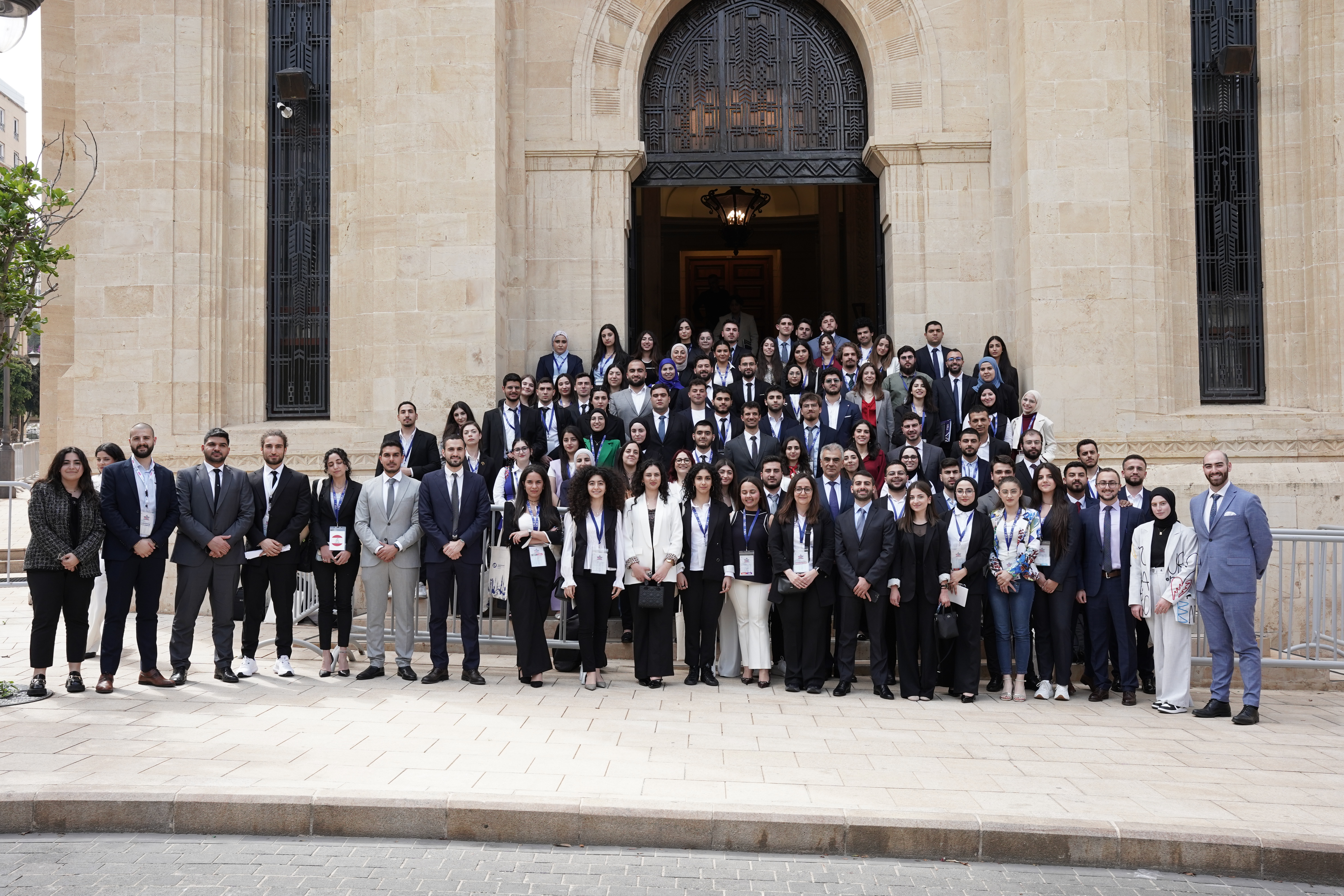
Participants and organizers of the 10th edition of the Model Youth Parliament stand outside the Lebanese Parliament
© FNF LebanonBy the time the gavel struck in the Lebanese Parliament on April 28, 2025, something rare had happened. Not a headline, not a protest — but a kind of awakening. Over 100 students had filled the chamber that day, not to watch their country’s future be debated, but to practice building it themselves.
This was the peak of the Model Youth Parliament (MYP), a flagship program organized by the Friedrich Naumann Foundation for Freedom Lebanon (FNF) in partnership with the Student Life Office at Saint Joseph University of Beirut (USJ). Now in its 10th edition, the program did not just simulate lawmaking. It dared to ask what a reimagined Lebanon could look like, if led by those bold enough to question its present.
A Preparatory Hub for Political Imagination
Nevertheless, the story began long before students stepped into Parliament. It started on April 12, in a lecture hall transformed into a “Preparatory Hub”, where students from across Lebanon, north and south, USJ and Lebanese University students, came together for the first time.
On April 26, instead of being sorted by sect or ideology, they were thrown into a social experiment. In an exercise called “Identity Changer”, students were asked to draw affiliation to political groups, ones they might not personally support — and embody their platforms. The purpose was not to confuse. It was to liberate. To break down assumptions, shake up tribal loyalties, and train young minds to step into another’s shoes. What emerged was nothing short of political theatre. It was uncomfortable. It was honest. Moreover, it was the kind of learning rarely found in textbooks.
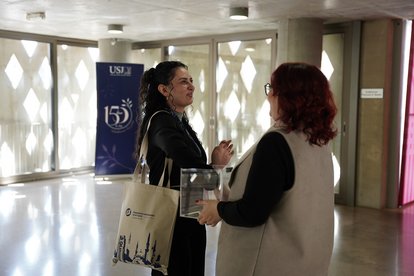
Here neutrality ends and politics begin
© FNF LebanonReal Draft Laws, Real Debates, Real Stakes
From there, the program unfolded with the intensity of a real legislative process. Over several simulation days, students studied and debated four draft laws that tackled some of Lebanon’s most urgent and polarizing issues:
- Reforming the Military Tribunal Law, limiting its jurisdiction over civilians and enhancing fair trial protections.
- Restructuring the Public Sector, introducing oversight and efficiency in a system riddled with redundancy.
- Electoral Law Reform, granting Lebanese abroad full voting rights and expanding access through mega voting centers.
- Border Demarcation Legislation, aiming to legally enshrine Lebanon’s land boundaries and ensure transparency in any future negotiations.
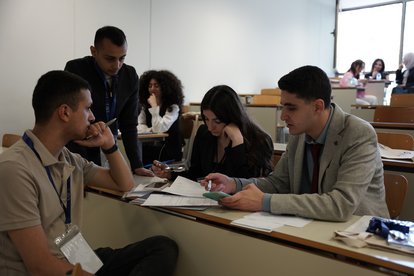
Debates during Parliamentary Committees Sessions
© FNF LebanonThese were not symbolic exercises. The laws were selected because they reflect current proposals in the national discourse, many of which are stalled in Parliament. By giving these drafts to the students, MYP posed a challenge: Could they do what elected officials often struggle to do, read, amend, and pass laws in good faith?
The answer, overwhelmingly, was yes.
Committees, Conflict, and Compromise
In committee sessions, students negotiated party lines that were entirely of their own invention, fictional but emotionally real. They debated not to win, but to persuade. They asked hard questions about corruption, accountability, and the line between military necessity and civil liberties. Some clashed, others compromised. All learned.
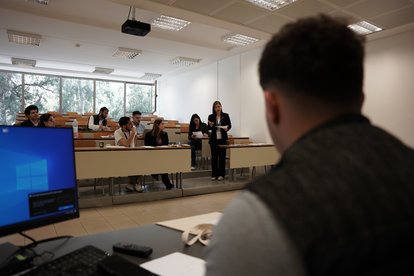
Political groups meetings were in order
© FNF LebanonMeanwhile, skills sessions in public speaking, debating, and legislative process gave participants the tools to sharpen their arguments and clarify their positions.
It was messy. And that was the point.
The Final Act: A Seat in Parliament
What elevated the experience, however, was the final act. On April 28, students moved the simulation into Lebanon’s actual Parliament — a building that for many had long symbolized dysfunction, deadlock, and disappointment. Yet for a day, it belonged to the students.
Under the watchful eyes of MPs, university officials, and civic leaders, the young participants debated their amended laws in plenary and voted electronically!
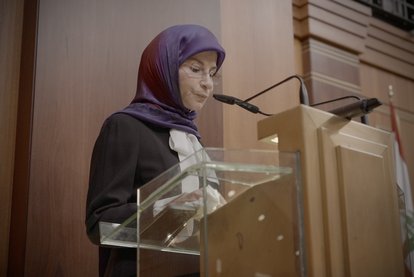
MP. Inaya Ezzeddine delivering a speech on behalf of Speaker of Lebanese Parliament Mr. Nabih Berri
MP Dr. Inaya Ezzeddine, who attended on behalf of Speaker Nabih Berri, opened the day with a striking message. “You are not just the future — you are the now,” she told the students, praising their energy, critical thinking, and refusal to inherit Lebanon’s broken political culture without resistance.
Alongside her, MP Dr. Salim Sayegh, USJ President Fr. Salim Daccache, and FNF Lebanon Project Manager May El Masri all reinforced the message: political education is not a luxury. It is a necessity, especially in times of collapse.
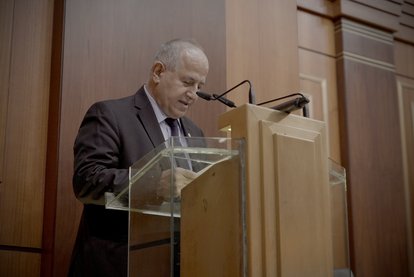
USJ President Fr. Salim Daccache
© FNF LebanonA Generation Ready to Lead
May El Masri, speaking on behalf of FNF, reminded participants that MYP was developed in some of Lebanon’s most difficult years — politically, economically, and socially. And yet it endured.
“What kept us going,” she said, “was a single truth: that young people still believe in changing this country. We owe it to them to give them the tools.”
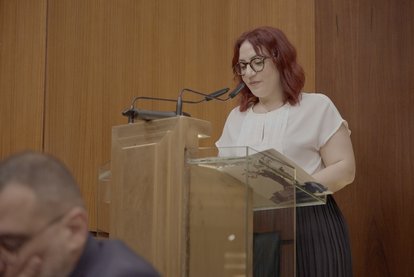
FNF Lebanon Project Manager May El Masri
© FNF LebanonBy the end of the session, four students were named as the winners of this year’s edition. Selected for their leadership, articulation, and collaborative spirit, they will go on an educational visit to Berlin with FNF. There, they will meet German lawmakers, explore democratic institutions, and reflect on the paths open to countries that invest in democratic participation and liberal values.
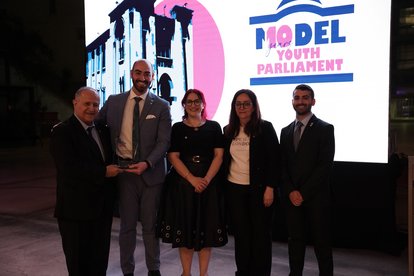
MYP 10 Gala Dinner and Ceremony
© FNF LebanonMore Than a Simulation
In truth, every student who participated left with something far greater than a certificate or a trip. They left with a new sense of possibility, that in a country that too often sidelines its youth, their voices could actually shape the rules.
For FNF, this is more than a project. It is a manifestation of liberal principles; the belief that individuals, when equipped with knowledge and space, can govern themselves wisely. It is a rejection of fatalism, and a bet on Lebanon’s greatest untapped resource: its youth.
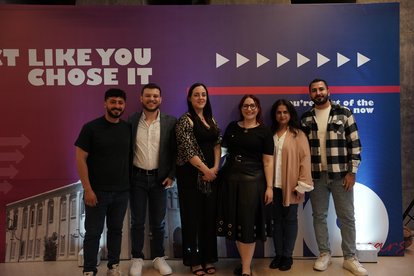
FNF Lebanon team
© FNF LebanonIn a nation where political inheritance often outweighs innovation, the Model Youth Parliament is an act of defiance, and of hope. It teaches that consensus is possible, that opposition can be respectful, and that reform is not a myth. It simply needs people willing to practice it.
In Parliament, for one day, they did just that.
